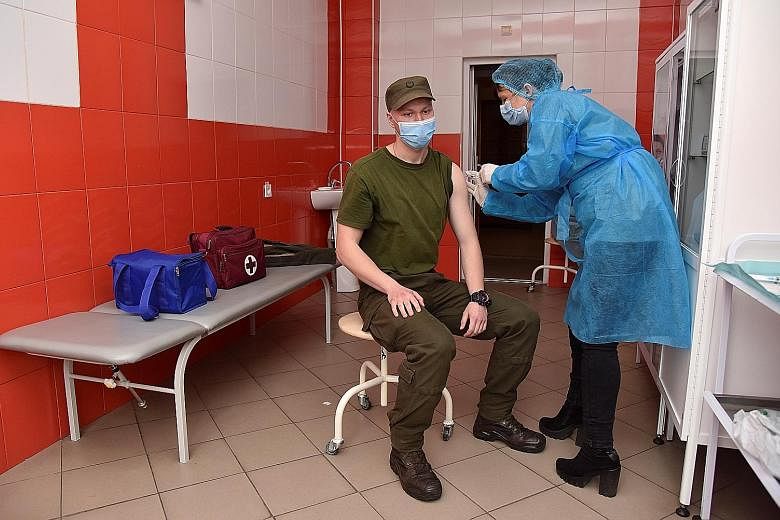KIEV/OTTAWA • As safety concerns prompt western European countries to limit the use of AstraZeneca's coronavirus vaccine, Ukraine is leading a charge from the continent's east to scoop up unwanted doses.
The Kiev government, which has struggled to secure Covid-19 vaccine supplies, says it has been talking to the European Union about potential purchases for months.
With Denmark banning the use of the AstraZeneca jab altogether last week, the Czech Republic, Latvia and Lithuania have joined the pursuit.
Eastern Europe has been the global epicentre for coronavirus deaths and infections in recent weeks - leaving the region desperate for more vaccine doses.
The inoculation programme in Ukraine is among Europe's slowest, making people there more inclined to look past worries over blood clots and accept the AstraZeneca jab.
"Nobody's going to refuse a vaccine," Ukrainian Health Minister Maksym Stepanov said in an interview in his office. "The benefits from all approved vaccines far outweigh the risk of side effects."
While Ukraine has signed contracts for 32 million doses, less than a million shots have arrived so far - from AstraZeneca and China's Sinovac Biotech.
With AstraZeneca deliveries delayed as infections soar in India, where the producer is located, Ukraine has vaccinated just 433,000 of its 42 million population.
Russia's Sputnik V jab, which is being used by EU member Hungary, has been rejected, with tensions between the governments in Kiev and Moscow flaring again in recent days.
The health situation, meanwhile, is becoming more urgent: Daily new cases hit a record of more than 20,000 this month.
No offers have emerged from EU countries selling unwanted shots, according to Mr Stepanov.
"Every country cares exclusively for its own citizens to the exclusion of everyone else," he said.
There could be other problems.
A March survey found that while almost half of the population want to be vaccinated, more than two-thirds would refuse the AstraZeneca jab - for which less than 0.25 per cent of Ukrainians have reported side effects. More than two-fifths of people do not even know how to register to get themselves vaccinated.
Mr Stepanov says the shortage of doses - not hesitancy about their safety - is the main reason for the slow pace of inoculation.
Ukraine is in talks to secure another 16 million vaccine doses this year and wants to administer them all by the year end - stepping up the pace to five million to six million doses a month by using open-air stadiums, he said.
Speed will be vital as hospitals in big cities reach capacity and people bristle at prolonged coronavirus lockdown measures.
As at Thursday, 187,731 jabs had been given this month, though 117,000 doses produced by Pfizer arrived the next day as part of the World Health Organisation-led Covax initiative.
"We're waiting for the vaccines," Mr Stepanov said. "We're fully prepared."
Meanwhile in Canada, the health authorities on Saturday reported its second case in a week of rare blood clots with low platelets after immunisation with AstraZeneca's jab, while it said it still recommended the use of the shot.
The person who experienced the very rare event has been treated and is recovering, the Health Ministry said, adding that the person lives in Alberta. Based on the evidence available, Canada still maintains that the benefits of the AstraZeneca vaccine outweigh the potential risks, it added.
Canadian health authorities "will continue to monitor the use of all Covid-19 vaccines closely and examine and assess any new safety concerns", the ministry said.
Canada reported a first blood clotting associated with the vaccine last Tuesday, and a day later, after a review, the health authorities said they would not restrict use of the AstraZeneca vaccine.
A separate advisory council had earlier recommended that Canada stop offering the vaccine to people aged under 55. That panel is in the process of reviewing its advice.
Canada has been ramping up its vaccination campaign, but still has a smaller percentage of its population inoculated than dozens of other countries, including the United States and Britain.
BLOOMBERG, REUTERS

